 NATIONAL DEFENSE RESEARCH INSTITUTE
NATIONAL DEFENSE RESEARCH INSTITUTE
S URPRISE !
From CEOs to Navy SEALs:
How a Select Group of Professionals Prepare
for and Respond to the Unexpected
Dave Baiocchi D. Steven Fox
Prepared for the United States Army
Approved for public release; distribution unlimited
The research described in this report was prepared for the National Reconnaissance Office. The research was conducted within the RAND National Defense Research Institute, a federally funded research and development center sponsored by the Office of the Secretary of Defense, the Joint Staff, the Unified Combatant Commands, the Navy, the Marine Corps, the defense agencies, and the defense Intelligence Community under Contract NRO-000-12-C-0187.
Library of Congress Cataloging-in-Publication Data
Baiocchi, Dave.
Surprise! : from CEOs to Navy Seals : how a select group of professionals prepare for and respond to the unexpected / Dave Baiocchi, D. Steven Fox.
1 online resource.
Includes bibliographical references.
Description based on print version record and CIP data provided by publisher; resource not viewed.
ISBN 978-0-8330-8104-9 (epub) -- ISBN 978-0-8330-8105-6 (prc) -- ISBN 978-0-8330-8106-3 ( ebook/pdf) -- ISBN (invalid) 978-0-8330-8103-2 (pbk. : alk. paper)
1. Emergency management. 2. Surprise. I. Fox, D. Steven. II. Title.
HD49
658.40354dc23
2013031251
The RAND Corporation is a nonprofit institution that helps improve policy and decisionmaking through research and analysis. RANDs publications do not necessarily reflect the opinions of its research clients and sponsors.
Support RANDmake a tax-deductible charitable contribution at www.rand.org/giving/contribute.html
RAND is a registered trademark
Cover design by Pete Soriano
Copyright 2013 RAND Corporation
This document and trademark(s) contained herein are protected by law. This representation of RAND intellectual property is provided for noncommercial use only. Unauthorized posting of RAND documents to a non-RAND website is prohibited. RAND documents are protected under copyright law. Permission is given to duplicate this document for personal use only, as long as it is unaltered and complete. Permission is required from RAND to reproduce, or reuse in another form, any of our research documents for commercial use. For information on reprint and linking permissions, please see the RAND permissions page (www.rand.org/pubs/permissions.html).
RAND OFFICES
SANTA MONICA, CA WASHINGTON, DC
PITTSBURGH, PA NEW ORLEANS, LA JACKSON, MS BOSTON, MA
DOHA, QA CAMBRIDGE, UK BRUSSELS, BE
www.rand.org
Preface

The objective of this research was to investigate how a variety of professions prepare for and respond to surprise. After speaking with former ambassadors, chief executive officers, military personnel, and health care professionals (among others), we report on some common methods and techniques that they use to prepare for and respond to unforeseen situations. We focused on two factors that influence how practitioners deal with surpriseavailable response time and level of chaos in the work environmentand we note how these factors affect peoples approaches toward preparing for and responding to unexpected events.
We performed this research for the Advanced Systems & Technologies Directorate (AS&T) at the National Reconnaissance Office (NRO). The NRO faces an operational environment that is faster paced, more uncertain, and filled with more variables than it was even ten years ago. One of the biggest challenges facing the Intelligence Community today is that it must confront unknown threats that continue to emerge from unexpected directions. To address these challenges, the NRO asked RAND to investigate how other occupations prepare for and respond to unexpected events (surprises). For example: Are there practices that medical practitioners, military personnel, or foreign service workers employ that could teach AS&T something about how to better prepare for unexpected events? The findings from this research will therefore be useful to NRO strategists as they make plans to shape the workforce and future operations.
This research was conducted within the Intelligence Policy Center of the RAND National Security Research Division (NSRD). NSRD conducts research and analysis on defense and national security topics for the U.S. and allied defense, foreign policy, homeland security, and intelligence communities and foundations and other nongovernmental organizations that support defense and national security analysis.
For more information on the Intelligence Policy Center, see http://www.rand.org/nsrd/ndri/centers/intel.html or contact the director (contact information is provided on the web page).
Figures and Tables

Figures
Tables
Summary

Nearly all professionalsincluding laborers, knowledge workers, and policymakersmust deal with the unexpected. Indeed, many organizations face an operational environment that is faster paced, more uncertain, and filled with more variables than it was even ten years ago. Some professionals must respond to changes in their environment quicklysometimes instantaneouslywhich makes planning for the unexpected of critical importance.
Anecdotal evidence suggests that people in different occupations respond to unexpected situations, or surprises, in different ways. For example, every National Football League (NFL) coach develops a playbook that aims to catalogue and have a play ready for every possible situation that might occur during a game. In other words, the coach deals with the unexpected by trying to prevent surprises from being surprises at all. In contrast, a Navy Sea, Air, Land (SEAL) special forces member cannot possibly anticipate every type of situation that might occur in a military operating environment and therefore cannot catalogue all the what if scenarios. Instead, the SEAL prepares for the unexpected by focusing on important but broad parameters relevant to every mission: What is the mission goal? What is the route to the target? What are the primary threats the team is likely to face?
Such observations provoked questions about how different professions prepare for and respond to surprise, as well as an interest in deriving lessons on how professionals of all sorts can become more adept at planning for an uncertain future. This report represents an investigation into what diverse professionals believe creates surprise, how they respond to it, and how the effects of surprise can be mitigated.
To explore these issues, we explored existing literature on decisionmaking, used this material as context for developing a framework for thinking about how different professionals respond to surprise, and conducted discussions with a wide variety of professionals. (We have refrained from disclosing the names of persons with whom we spoke because part of our research approach was to promise participants anonymity to ensure their candor.) In our discussions, we asked questions that sought to highlight the techniques and tools each person relies on when responding to surprise.

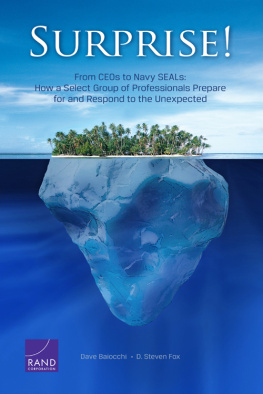




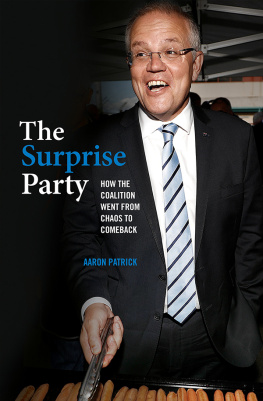
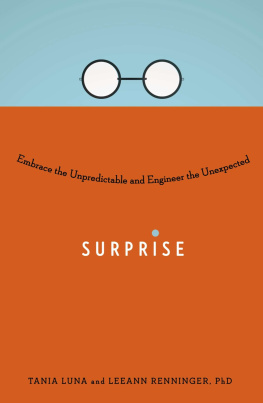
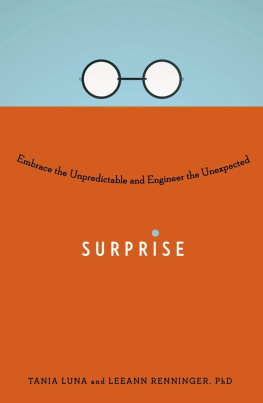
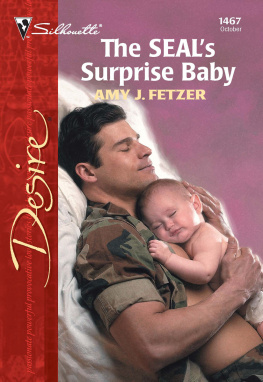

 NATIONAL DEFENSE RESEARCH INSTITUTE
NATIONAL DEFENSE RESEARCH INSTITUTE